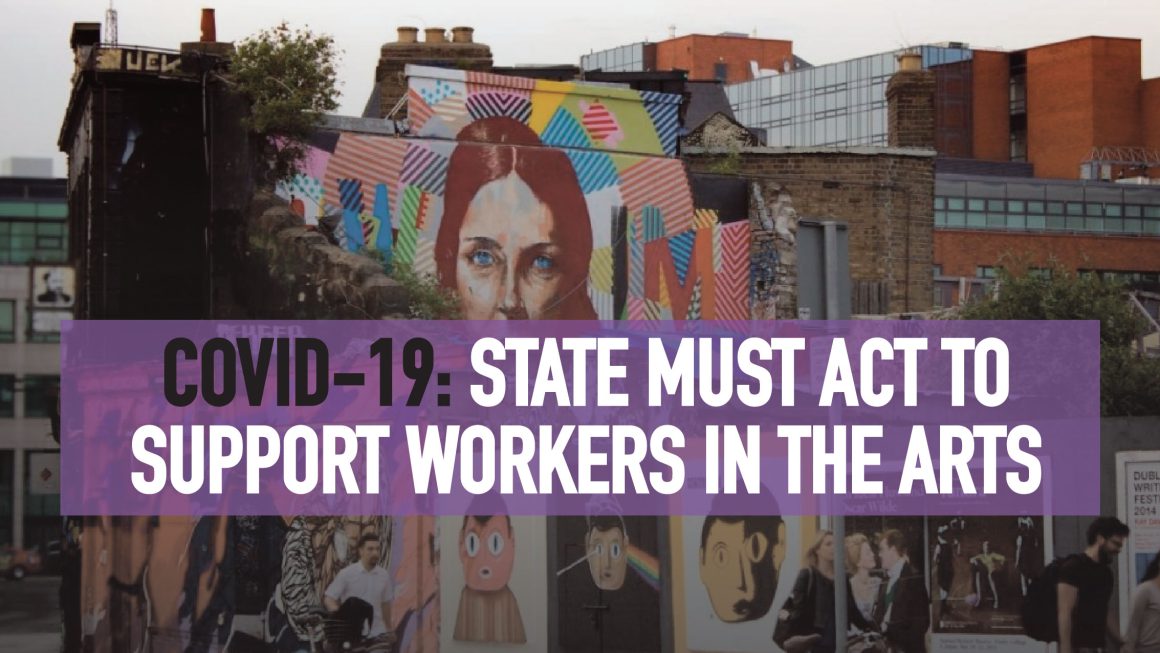By Martina Stafford
The precarious conditions of work for artists and performers has been acutely exposed by the Covid-19 pandemic. Ireland’s culture of under-payment for artists’ work leaves many feeling like it is a race to the bottom for the crumbs of an ever shrinking loaf. The crumbs being offered by the government due to the Covid-19 pandemic amount to €3,000 each for 330 “winners” out of the thousands of artists across the country.
To add insult to injury, artists are not allowed to apply for this one-off payment if they are in receipt of the covid-19 payment of €350 a week. As well as this, under-graduate and postgraduate students are banned from applying altogether. This is more of the same from the hostile duo of The Department of Social Protection and The Department of Culture, Heritage and the Gaeltacht.
Paltry state supports for artists
For many artists, bursaries, grants, awards and social welfare schemes can provide temporary financial relief, however, the effort exerted to manoeuvre the bureaucracy of these departments vastly outweighs the benefits and likelihood of becoming a “winner” is slim. One has to wonder how much “cultural funding” is now devoted to the state’s own bureaucratic processes to guard against the very people it is claiming to support from attaining these funds.
According to a report published by Visual Arts Ireland in 2016, only 30% of visual artists had applied for unemployment benefits in the previous five years due to treatment by the social welfare system. Interestingly, the usual scrutiny enacted by The Department of Social Protection for welfare claims has been exposed as cruel and unnecessary when compared with the simple one-page document required for the Covid-19 emergency payment.
Due to minuscule economic gains, artists are forced to enter a rat race, competing with their peers for limited funding, limited gigs, limited exhibitions, limited arts spaces, limited radio slots etc. A low bar has been set due to the government’s unwillingness to treat the arts with any degree of seriousness. Government investment in culture in Ireland is lower than any other country in Europe. NCFA figures report that 0.1% of GDP is spent in Ireland compared to an average of 0.6% of GDP in other European countries.
An undervalued and precarious existence
According to a survey conducted by Theatre Forum in 2018, many artists work for low pay and experience poor employment conditions. Thirty percent of artists and creative practitioners in the performing arts earn less than the 2018 National Minimum wage of €9.55 per hour. This is partly because 83% were paid flat fees regardless of the number of hours worked. Artists have limited employment options, making too few or no PRSI and voluntary pension contributions, putting benefits such as maternity, parental and sick leave as well as pensions and housing out of reach.
For many artists, it takes years to get to a point where they have set up some kind of steady flow of income to meet the basic cost of living. Prominent features of the experience of Irish artists include working for the ‘exposure’, for the experience, for free alcohol, for working alongside a famous artist etc. Such features communicate to the artist that there is no value in the work of an artist who isn’t clearly a profitable enterprise.
For a living wage for all in the arts
This pandemic has put into focus the important role that these workers play in society — their absence being felt by many — and the extent to which it absolutely doesn’t match their economic conditions. Why do they struggle to exist on the lowest rung of the ladder in a system that forces you to try to beat others off the ladder in order to get to the next rung. Many of us don’t want to “climb” such a ladder, we just want ownership over our work in order to do our best work for the good of society.
There is no doubt that the work of artists makes an enormous contribution to our society. As well as this, according to Indecon, for every €1 invested in culture, almost €2 is returned in direct taxation — so the question remains; why are artists struggling to make ends meet? There is vast wealth in Irish society, but it’s concentrated in the hands of a tiny elite, such as the 300 richest individuals who own €87 billion between them. The inequality in society is extreme, and inexcusable. The state must intervene to ensure a living wage for all, at a minimum, which clearly cannot be delivered by a free market economy.












